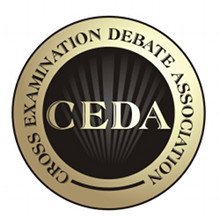Cross Examination Debate Association
 From Wikipedia the free encyclopedia
From Wikipedia the free encyclopedia
 | |
| Company type | Nonprofit organization, policy debate |
|---|---|
| Founded | 1971 |
| Headquarters | United States |
Key people | Phillip Samuels, President[1] |
| Website | cedadebate |
The Cross Examination Debate Association (CEDA) (/ˈsiːdə/ SEE-də) is the largest intercollegiate policy debate association in the United States. Throughout the school year, CEDA sanctions over 60 tournaments throughout the nation, including an annual National Championship Tournament that brings together over 175 individual debate teams from across the nation to compete on the basis of research, persuasive speaking, argumentation, and philosophy.
For a number of years, CEDA employed a two-person team value debate format. CEDA utilized two topics each year, one governing the fall semester and the second governing the spring semester. For the spring 1996 topic, it was voted[2] to continue debating the fall topic about Mexico. Beginning with the 1996–1997 season, however, CEDA has employed a single, year-long policy debate topic.
Past Winners
[edit]Year Winner
1986 Macalester College (Paul Benson and Molly McGinnis)
1987 Macalester College (Paul Benson and Molly McGinnis)
1988 Southern Illinois University (Mark West and John Lapham)
1989 Gonzaga University (Dave Hanson and Bill DeForeest)
1990 University of Central Oklahoma (then Central State University) (Charles Mallard and Josh Hoe)
1991 Kansas State University (David Filippi and Richard McCollum)
1992 Missouri State University (Jeffrey Jarman and TJ Wolfe)
1993 Kansas State University (Jill Basinger and KJ Wall)
1994 University of Missouri-Kansas City (David Kingston (Genco) and James Brian Johnston)
1995 Michigan State University (Elizabeth Repko and Jason Trice)
1996 Southern Illinois University (Glen Frappier and Bill Shinn)
1997 Northwestern University (Terry Johnson and Brandon Fletcher)
1998 Emory University (Stephen Heidt and Dan Fitzmier)
1999 Whitman College (Jessica Clarke and Adam Symonds)
2000 The State University of West Georgia (Rachel Saloom and Sarah Holbrook)
2001 The State University of West Georgia (Rashad Evans and Sarah Holbrook)
2002 Fort Hays State University (Joe Ramsey and Jason Regnier)
2003 New York University (Richard Garner and Nate Gorelick)
2004 Emory University (Mike Beckley and Henry Liu)
2005 UC Berkeley (Craig Wickersham and Stacey Nathan)
2006 Harvard (Michael Klinger and Nikhil Mirchandani)
2007 University of Oklahoma (Conor Cleary and Blake Johnson)
2008 Towson University (Dayvon Love and Deven Cooper)
2009 University of Oklahoma (R.J. Giglio and Nick Watts)
2010 University of Oklahoma (R.J. Giglio and Nick Watts)
2011 Kansas State University (Beth Mendenhall and Derek Ziegler)
2012 University of Oklahoma (R.J. Giglio and Christopher Leonardi)
2013 Emporia State University (Ryan Wash and Eli Smith)
2014 Towson University (Korey Johnson and Ameena Ruffin)
2015 Towson University (Troi Thomas and Kevin Whitley)
2016 University of Vermont (Khalil Lee and Taylor Brough)
2017 Rutgers University (Nick Nave and Devane Murphy)
2018 University of Iowa (Sam Gustavson and Geordano Liriano)
2019 University of Oklahoma (Jazmine Pickens and Darius White)
2020 Tournament Canceled due to COVID-19
2021 University of Texas (Het Desai and Zachary Watts)
2022 Wake Forest University (Asya Taylor and Dimarvin Puerto)
2023 Wake Forest University (Ana Bittner and Ari Davidson)
2024 Binghamton University (Eli T. Louis & Akif Choudhury)
2025 Iowa University (Grey Parfenoff & Spencer Anderson McElligott)
See also
[edit]References
[edit]- ^ "Officers". Cedadebate.org.
- ^ "Re: Spring 1996 Topic". Archived from the original on 2016-10-25.